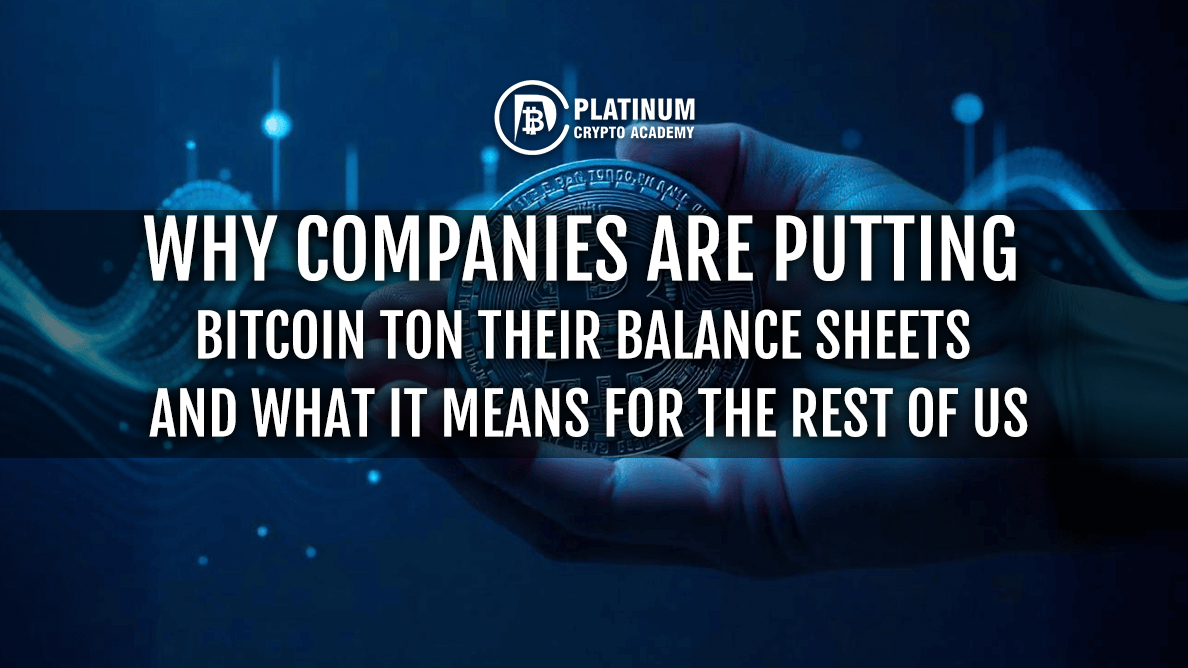There’s a quiet revolution happening in corporate finance and it starts with a simple but radical idea: maybe cash isn’t safe anymore.
For decades, the gold standard of financial security was just that gold. Or if not, it was cash, short-term bonds, and treasury bills. Safe, predictable, stable. That’s where companies kept their war chests, their reserves, their “just in case” capital.
But what happens when the rules of the game change? What happens when the money itself starts to erode in value, slowly but surely, as central banks print more, and inflation eats away at purchasing power?
For a growing number of companies, the answer has become clear: you stop sitting on melting ice. You start buying Bitcoin.
Now, I know what you’re thinking. Bitcoin? For a corporate treasury? Isn’t that too volatile? Too risky? But if you dig deeper, the move starts to make a lot of sense not just financially, but philosophically.
Bitcoin, in the eyes of many forward-thinking execs, is more than just a volatile asset. It’s a shield. A long-term hedge against everything that’s broken in the traditional system. It’s like gold, except programmable, borderless, and liquid 24/7.
Think about that for a moment. You’re a company sitting on $100 million in cash. You know inflation is creeping in. You’ve seen what loose monetary policy can do. And now, you have an asset that not only protects purchasing power but could grow, significantly, over time.
That’s the fundamental reason companies are allocating a portion of their reserves into Bitcoin. They’re not trying to time the market. They’re not chasing a quick win. They’re betting that the future favors scarcity, decentralization, and innovation.
But Bitcoin on the balance sheet isn’t just about protecting value it’s about projecting vision.
When a company announces they’re holding BTC, it sends a signal. It says, “We’re not just playing it safe we’re thinking ahead.” And in an era where being future-forward matters more than ever, that message carries weight.
Investors take notice. Customers take notice. Partners, employees, even competitors everyone starts paying attention.
No one has embodied this philosophy more than Michael Saylor, the outspoken CEO of MicroStrategy. In 2020, while most CEOs were focused on cost-cutting and weathering the pandemic, Saylor made a bold move: he took $250 million from the company’s treasury and bought Bitcoin.
To some, it seemed reckless. But to him, it was simple math.
He called cash a “melting ice cube.” He saw Bitcoin as a lifeboat, and he jumped in headfirst.
Since then, Saylor hasn’t looked back. MicroStrategy now holds over 250,000 BTC, making it one of the largest corporate holders of Bitcoin in the world. And they didn’t just buy with spare cash. They issued bonds. Sold stock. Took on debt. All to acquire more BTC.
In essence, Saylor turned his software company into a Bitcoin accumulation machine and investors loved it.
MicroStrategy’s stock became a leveraged Bitcoin play. As the price of BTC rose, so did the company’s valuation. It created a feedback loop where higher Bitcoin prices meant more equity to raise, more capital to deploy, and more BTC to buy. It was a masterclass in financial engineering but rooted in conviction.
And that’s what stands out the most.
Saylor didn’t hedge. He committed. And in doing so, he unlocked a new chapter in corporate strategy one where companies don’t just manage capital, they multiply it through exposure to digital assets.
Of course, not everyone is going full Saylor.
Take GameStop, for example. Their recent approval to add Bitcoin to their reserves feels more cautious, more exploratory. But the intention is the same: protect value, tap into upside, and align with a digitally-native future.
It’s a sign of the times. What used to be a fringe idea is becoming mainstream finance.
So what does this mean for you and me?
It means validation. It means the asset we’ve believed in, studied, and maybe even struggled to explain to our families is being taken seriously by billion-dollar companies. It means the walls between traditional finance and crypto are coming down.
And maybe, just maybe, it means the world is finally waking up to the idea that the future of money doesn’t sit in a vault it lives on the blockchain.
So the next time someone rolls their eyes when you talk about Bitcoin, tell them this: while they’re busy mocking memes, the smartest companies in the world are stacking sats and doing it with purpose.
Hopefully, you have enjoyed today’s article. Thanks for reading! Have a fantastic day! Live from the Platinum Crypto Trading Floor.
Earnings Disclaimer: The information you’ll find in this article is for educational purpose only. We make no promise or guarantee of income or earnings. You have to do some work, use your best judgement and perform due diligence before using the information in this article. Your success is still up to you. Nothing in this article is intended to be professional, legal, financial and/or accounting advice. Always seek competent advice from professionals in these matters. If you break the city or other local laws, we will not be held liable for any damages you incur.


